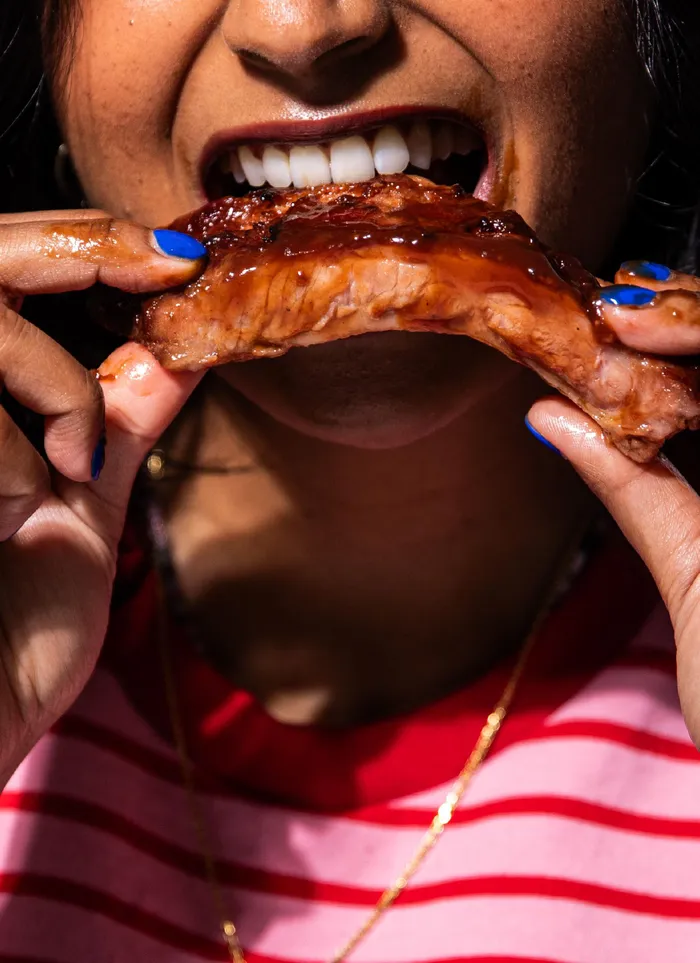
A South African tucks into pork ribs, which are among the products sold at Eskort's 30 retail stores across the country. The company plans to open four more stores this year.
Image: Supplied
Eskort is not just about bacon or Viennas; the food processing company behind the brand has added four retail stores across the country in a growth spurt at the end of last year, with more planned for the future.
As the manufacturer and processor of iconic antibiotic-free pork products, growing a retail chain may not seem like an obvious path to profit. However, for Eskort, it has proven a successful strategy.
The company now operates 30 stores nationwide, with the first one opened in the Western Cape among the four new locations recently launched. Most of these are owned and operated by Eskort, while a handful are run by franchisees.
In an interview with BR, Eskort's marketing director, Marcelle Pienaar, said that the company opened its first retail store in Estcourt, KwaZulu-Natal, in 1951, near its first manufacturing facility. The second store followed in the 1970s in Heidelberg, where a second manufacturing plant was established.
Pienaar explains that establishing these stores requires careful consideration, as the intention is not to compete with existing retail stores that stock Eskort products. The stores aim to cater to both high and low-income consumers, necessitating strategic positioning. Additionally, production must be scaled up at the manufacturing facilities to supply the stores effectively.
High-end shop fittings and colourful packaging create cheerful environments, but a striking aspect is the range available in their open fridges. Pienaar said that while the average supermarket shopper may be familiar with about 40 Eskort products, the Eskort stores carry over 300.
“They’re the result of our investment in world-leading technology, as well as the innovative efforts of our in-house team of food technologists and recipe developers,” she said. One of the store favourites are the hampers, particularly among small and medium-sized businesses.
As expected from a company founded by a group of farmers in a KwaZulu-Natal "bacon factory" in 1917, bacon remains a staple alongside sausages and Viennas. The stores also offers fresh and braai pork cuts, many targeting the premium market. Pienaar said that Eskort’s convenience foods have significantly contributed to driving retail revenue and attracting repeat customers.
She adds that pork ranks fourth in the lineup of meat proteins consumed in South Africa, following chicken, beef, and lamb. In contrast, pork is the primary protein in many parts of Europe and most of Asia, which indicates that there is still big potential for increased pork consumption among South Africans.
Among the other innovations at the stores are an air fryer range that debuted last year and a family braai box that arrived just in time for the summer holidays. This year, the introduction of a selection of kids’ meals is also planned, according to Pienaar.
With farmers as leading shareholders, two small-town factories—one in Estcourt and the recently expanded facility in Heidelberg, Gauteng—and a growing range of stores, Eskort has created a closed value chain.
“It’s been a deliberate strategy but also a cautious one. We realised the growth we aspired to wouldn’t be possible by working solely through established retailers, so we needed our own retail chain. However, we wanted to build it slowly and thoughtfully, applying important lessons as we progressed,” she explains.
It took 11 years to establish 28 of the 30 stores across seven of the eight provinces, with plans to continue expanding in a “thoughtful and controlled way.” The goal is to open four new stores in 2025, bringing the total to 34.
“Shopping at Eskort is akin to choosing a specialist clothing store rather than picking up a T-shirt in the corner of a supermarket. The choice we offer is much greater, and prices are competitive because we’re selling directly to consumers,” she said.
BUSINESS REPORT